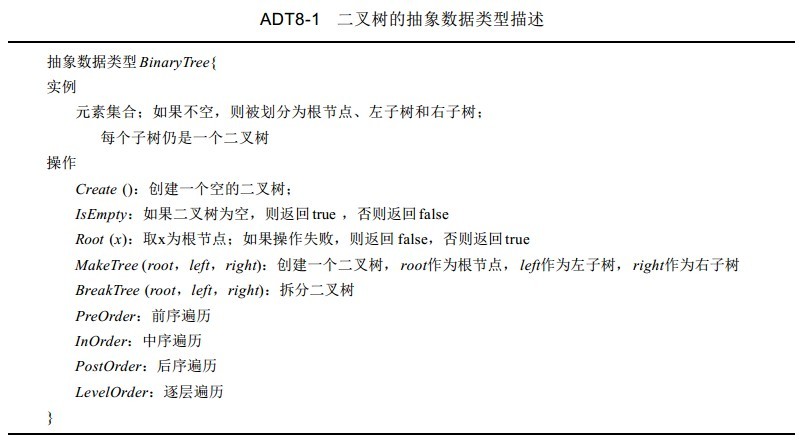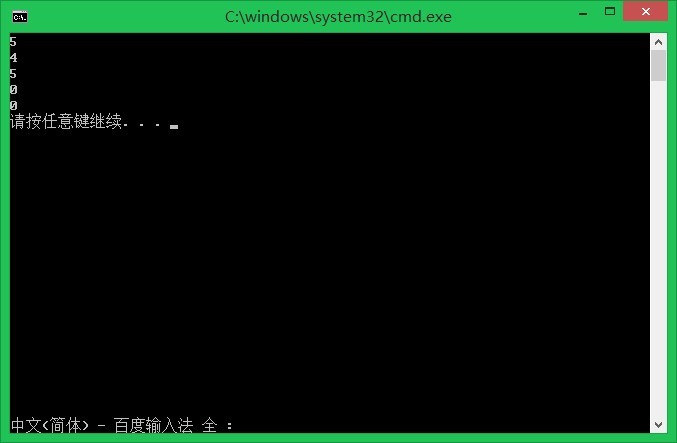二叉树的定义见:二叉树实现:公式化描述
二叉树最常用的描述方法是用链表或指针。每个元素都用一个有两个指针域的节点表示,这两个域为 L e f t C h i l d和R i g h t C h i d。除此两个指针域外,每个节点还有一个 d a t a域。
二叉树的边可用一个从父节点到子节点的指针来描述。指针放在父节点的指针域中。因为包括n 个元素的二叉树恰有 n- 1 条边,因此将有2n- (n- 1 ) =n+ 1 个指针域没有值,这些域被置为0。
节点类:
1 template<class T> 2 class BinaryTreeNode 3 { 4 friend class BinaryTree<T>; 5 public: 6 //构造函数 7 BinaryTreeNode(){ LeftChild = RightChild = 0; } 8 BinaryTreeNode(const T& e){ data = e; LeftChild = RightChild = 0; } 9 BinaryTreeNode(const T& e, BinaryTreeNode *l, BinaryTreeNode *r) 10 { 11 data = e; 12 LeftChild = l; 13 RightChild = r; 14 } 15 private: 16 T data; 17 BinaryTreeNode<T> *LeftChild;//左子树 18 BinaryTreeNode<T> *RightChild;//右子树 19 };
二叉树:
1 template<class T> 2 class BinaryTree 3 { 4 public: 5 BinaryTree(){ root = NULL; 6 } 7 8 //复制构造函数 9 BinaryTree(const BinaryTree<T> &t); 10 ~BinaryTree(){}; 11 bool IsEmpty() const{ return root == NULL }; 12 bool Root(T& x)const;//获取根节点值 13 void MakeTree(const T& element, BinaryTree<T>& left, BinaryTree<T>& right);//创建二叉树 14 void BreakTree(T& element, BinaryTree<T> &left, BinaryTree<T> &right);//分拆二叉树 15 void PreOrder(void (*Visit)(BinaryTreeNode<T> *u))//前序遍历 16 { 17 PreOrder(Visit, root); 18 } 19 void InOrder(void(*Visit)(BinaryTreeNode<T> *u))const//中序遍历 20 { 21 InOrder(Visit, root); 22 } 23 void PostOrder(void(*Visit)(BinaryTreeNode<T> *u))const//后序遍历 24 { 25 PostOrder(Visit, root); 26 } 27 28 BinaryTreeNode<T>* CopyTree(const BinaryTreeNode<T>* t);//复制树 29 30 void LevelOrder(void(*Visit)(BinaryTreeNode<T> *u))const;//层序遍历
//各种遍历输出 31 void PreOutput()const; 32 void InOutput()const; 33 void PostOutput()const; 34 void LevelOutput()const; 35 void Delete(); 36 int Height()const//获取树的高度 37 { 38 return Height(root); 39 } 40 41 int Size();//树的节点数 42 private: 43 BinaryTreeNode<T> *root;//根节点 44 void PreOrder(void (*Visit)(BinaryTreeNode<T> *u), BinaryTreeNode<T> *t); 45 void InOrder(void(*Visit)(BinaryTreeNode<T> *u), BinaryTreeNode<T> *t)const; 46 void PostOrder(void(*Visit)(BinaryTreeNode<T> *u), BinaryTreeNode<T> *t)const; 47 int Height(BinaryTreeNode<T> *t)const; 48 49 50 static void output(BinaryTreeNode<T> *t) 51 { 52 std::cout << t->data << ' '; 53 } 54 55 static void freeNode(BinaryTreeNode<T> *t) 56 { 57 delete t; 58 t = NULL; 59 } 60 61 static void ctsize(BinaryTreeNode<T> *t) 62 { 63 ++count; 64 } 65 66 };
1 template<class T> 2 BinaryTreeNode<T>* BinaryTree<T>::CopyTree(const BinaryTreeNode<T>* t) 3 { 4 if (t) 5 { 6 BinaryTreeNode<T>* lchild = CopyTree(t->LeftChild); 7 BinaryTreeNode<T>* rchild = CopyTree(t->RightChild); 8 root = new BinaryTreeNode<T>(t->data, lchild, rchild); 9 } 10 11 return root; 12 } 13 14 template<class T> 15 BinaryTree<T>::BinaryTree(const BinaryTree<T> &t) 16 { 17 root = CopyTree(t.root); 18 } 19 20 21 22 template<class T> 23 int BinaryTree<T>::Size() 24 { 25 count = 0; 26 PreOrder(ctsize); 27 return count; 28 } 29
30 template<class T> 31 int BinaryTree<T>::Height(BinaryTreeNode<T> *t)const 32 { 33 if (!t) 34 { 35 return 0; 36 } 37 38 int ll = Height(t->LeftChild); 39 int lr = Height(t->RightChild); 40 41 if (ll > lr) 42 { 43 return ++ll; 44 } 45 else 46 return ++lr; 47 } 48 49 template<class T> 50 bool BinaryTree<T>::Root(T& x) const 51 { 52 if (root) 53 { 54 x = root->data; 55 return true; 56 } 57 return false; 58 } 59
//当left和right以及this二叉树有重复时,利用拷贝构造函数复制一部分,以免左右子树指向同一个而引发错误 60 template<class T> 61 void BinaryTree<T>::MakeTree(const T& element, BinaryTree<T>& left, BinaryTree<T>& right) 62 { 63 if (&left==&right&&this==&left) 64 { 65 BinaryTree<T> newTree = right; 66 BinaryTree<T> newTree2 = left; 67 root = new BinaryTreeNode<T>(element, newTree2.root, newTree.root); 68 } 69 else if (&left==&right) 70 { 71 BinaryTree<T> newTree = right; 72 root = new BinaryTreeNode<T>(element, left.root, newTree.root); 73 } 74 else if (this==&left||this==&right) 75 { 76 BinaryTree<T> newTree = *this; 77 root = new BinaryTreeNode<T>(element, left.root, newTree.root); 78 } 79 else 80 root = new BinaryTreeNode<T>(element, left.root, right.root); 81 82 left.root = right.root = NULL; 83 } 84 85 template<class T> 86 void BinaryTree<T>::BreakTree(T& element, BinaryTree<T> &left, BinaryTree<T> &right) 87 { 88 if (root==NULL) 89 { 90 std::cerr << "树为空,不能拆分" << std::endl; 91 return; 92 } 93 94 BinaryTree<T> newTree = *this; 95 element = newTree.root->data; 96 left.root = newTree.root->LeftChild; 97 right.root = newTree.root->RightChild; 98 99 delete root; 100 root = NULL; 101 } 102 103 template<class T> 104 void BinaryTree<T>::PreOrder(void(*Visit)(BinaryTreeNode<T> *u), BinaryTreeNode<T> *t) 105 { 106 if (t) 107 { 108 Visit(t); 109 PreOrder(Visit, t->LeftChild); 110 PreOrder(Visit, t->RightChild); 111 } 112 } 113 114 template<class T> 115 void BinaryTree<T>::InOrder(void(*Visit)(BinaryTreeNode<T> *u), BinaryTreeNode<T> *t)const 116 { 117 if (t) 118 { 119 InOrder(Visit, t->LeftChild); 120 Visit(t); 121 InOrder(Visit, t->RightChild); 122 } 123 } 124 125 template<class T> 126 void BinaryTree<T>::PostOrder(void(*Visit)(BinaryTreeNode<T> *u), BinaryTreeNode<T> *t)const 127 { 128 if (t) 129 { 130 PostOrder(Visit, t->LeftChild); 131 PostOrder(Visit, t->RightChild); 132 Visit(t); 133 } 134 } 135 136 template<class T> 137 void BinaryTree<T>::LevelOrder(void(*Visit)(BinaryTreeNode<T> *u))const 138 { 139 LinkedQueue<T> Q; 140 BinaryTreeNode<T> *t = root; 141 while (t) 142 { 143 Visit(t); 144 if (t->LeftChild) 145 { 146 Q.Add(t->LeftChild); 147 } 148 if (t->RightChild) 149 { 150 Q.Add(t->RightChild); 151 } 152 153 if (Q.IsEmpty()) 154 { 155 return; 156 } 157 Q.Delete(t); 158 } 159 } 160 161 template<class T> 162 void BinaryTree<T>::PreOutput()const 163 { 164 PreOrder(output, root); 165 } 166 167 template<class T> 168 void BinaryTree<T>::InOutput()const 169 { 170 InOrder(output, root); 171 } 172 173 template<class T> 174 void BinaryTree<T>::PostOutput()const 175 { 176 PostOrder(output, root); 177 } 178 179 template<class T> 180 void BinaryTree<T>::LevelOutput()const 181 { 182 LevelOutput(output, root); 183 } 184 185 template<class T> 186 void BinaryTree<T>::Delete() 187 { 188 PostOrder(freeNode, root); 189 root = NULL; 190 }
几个操作的解释:
前三种遍历可以用递归完成,层次调用则利用队列
删除:
要删除一棵二叉树,需要删除其所有节点。可以通过后序遍历在访问一个节点时,把其删除。也就是说先删除左子树,然后右子树,最后删除根。
计算高度:
通过进行后序遍历,可以得到二叉树的高度。首先得到左子树的高度 h l,然后得到右子树的高度h r。此时,树的高度为:m a x { h l, hr} + 1
简单测试:
1 #include<iostream> 2 #include "binaryTree.h" 3 4 int countx = 0; 5 BinaryTree<int> a, x, y, z; 6 7 template<class T> 8 void ct(BinaryTreeNode<T> *t) 9 { 10 ++countx; 11 } 12 13 void main(void) 14 { 15 y.MakeTree(1, a, a); 16 z.MakeTree(2, y, y); 17 x.MakeTree(3, y, z); 18 y.MakeTree(4, x, a); 19 y.PreOrder(ct); 20 21 std::cout << countx << std::endl; 22 std::cout << y.Height() << std::endl; 23 std::cout << y.Size() << std::endl; 24 y.Delete(); 25 std::cout << y.Height() << std::endl; 26 std::cout << y.Size() << std::endl; 27 }
